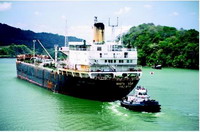Brazil may become major petroleum exporter
An offshore oil discovery and promising fields near the find could make Brazil to become one of the world's major exporters, but full-scale extraction is unlikely until 2013 and will be very expensive.

The "ultra-deep" Tupi field off the coast of Rio de Janeiro could hold as much as 8 billion barrels of recoverable light crude, and initial production should exceed 100,000 barrels daily, though experts believe the amount will then go much higher.
State oil company Petroleo Brasileiro SA will start pilot pumping in 2010 or 2011 but it will take several more years for full production to get under way, at a cost of billions of dollars (euros).
Bear Stearns analyst Marc McCarthy estimated the value of the oil in the block at US$25 billion to US$60 billion (17 billion EUR to 41 billion EUR) depending on international prices.
Tupi "is immense and marks the beginning of a new horizon for Brazil," he said in a note to clients.
After soaring 26 percent in New York on Thursday on news of the find, Petrobras' shares fell 6 percent in Friday afternoon trading.
After Petrobras announced the find, government officials said they were removing from auction dozens of promising blocks near Tupi - so Brazil can keep the oil for Petrobras instead of selling it off to foreign international oil players.
"We are sure the question will arise - will Brazil join OPEC?" McCarthy wrote. "But more importantly, it has established an aura of optimism for massive future exploration success."
Getting the oil out will be an expensive and formidable challenge because the oil is so deep under the earth's surface. The lag time before production means that any impact on world oil prices won't come soon.
Petrobras, however, is well-known for its experience in extracting oil from extremely deep offshore reserves and is widely regarded as one of the planet's best-run state oil companies.
Though tapping the Tupi field will be expensive, Petrobras is flush with cash for strategic investments because of growing production and high international oil prices.
The Tupi field lies under 2,140 meters (7,060 feet) of water, more than 3,000 meters (almost 10,000 feet) of sand and rocks, and then another 2,000-meter (6,600-foot) thick layer of salt.
Brazil on Thursday also announced it is withdrawing 41 blocks of prospective underwater oil extraction territory from an auction of oil blocks to be held this month. It will still put the remaining 261 blocks up for auction but will reserve the most promising areas around the Tupi field for Petrobras.
Petrobras says the Tupi field, off Brazil's southeastern Atlantic coast, has between 5 billion and 8 billion barrels - equivalent to 40 percent of all the oil ever discovered in Brazil.
Brazil's total oil reserves currently rank 17th in the world, with 14.4 billion barrels of oil equivalent, Petrobras chief executive Sergio Gabrielli said.
Thursday's news of the discovery rocked a country that became a net oil exporter only last year, but must still import light crude oil for the refined products it needs to fuel South America's largest economy. Brazil produces - and exports - mostly heavy crude oil, which has to be mixed with the light oil in refineries.
For a country that went deeply into debt buying foreign oil in the 1970s and 1980s, "this has changed our reality," said Dilma Rousseff, presidential chief of staff.
Petrobras has a 65 percent operating stake in the Tupi field, Britain's BG Group PLC holds 25 percent, and Petroleos de Portugal - a division of Galp Energia SA - holds the remaining 10 percent.
The Brazilian company is expected to release its third-quarter earnings report Friday night.
Petrobras' American depository shares were down US$7.12 (4.85 EUR) to US$109.65 (74.68 EUR) in Friday afternoon trading on the New York Stock Exchange.
Subscribe to Pravda.Ru Telegram channel, Facebook, RSS!


